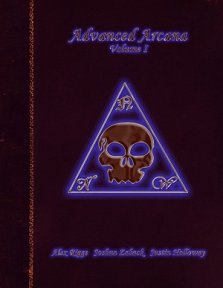
How does magical education work in your game? There's quite a trend within Pathfinder RPG product to suggest that you can go to school to study magic, just as you or I in the real world can take classes in history or computer science... a reasonable assumption in a setting where magic is part of everyday life. This book takes this view, opening with a note penned to a newly-accepted student by a family friend, an older mage who wishes him well. This explains the purpose of the work, a collection of spells that should prove useful to any aspiring mage. Three specialist groups of spells are mentioned: 'quick' spells which are lesser-powered versions of spells that can be cast fast in an emergency, spells which refresh the mind and enable the re-casting of spells already used for the day, and 'segmented' spells that occupy several slots rather than one, but allow pretty amazing things to be done.
Next are some delightful philosophical thoughts by the original author of the book, clearly someone who takes magic seriously and doesn't view it merely as a list of actions for use when brawling! Much of this skilfully blends an in-character approach with recognition of the underlying game mechanics... as example, "According to the ancient sage Drawzi of Astocthes. the cost of a spell is measured in mental energy, with spells being classified in nine tiers based on the amount of energy the spell consumes when cast", which is prehaps the most delightful way of describing that spells come in levels and the higher level your character is, the higher level spells he can cast that I have read! It's a very academic approach, some readers may find it a bit heavy going, but if you want to play a spell-caster who takes a studious approach to his magic it will give you some wonderful ideas to throw around in casual conversation to bemuse your colleagues who swing swords or pick locks for a living.
Following an outstanding illustration of a 'Young Mage' lounging with a book in his hand, a couple of sidebars explain the mechanical implications of segmented spells, showing how they play out, and notes on how best to incorporate the spells from this book into your game. A wizard wishing to buy his own copy of Advanced Arcana needs to come up with 25,000 gp, for example!
Now getting down to business, spell lists are followed by full write-ups of each new spell. There are lists of spells for alchemists, bards, clerics, druids, inquisitors, paladins, rangers, sorcerers/wizards, summoners, and witches. The full spell descriptions are presented in standard format, and merely reading through them conjures up many an idea for using them to effect...
As example of the novel concept of the segmented spell, have you ever wondered how places consecrated to a particular deity have all those cool effects associated with them? Perhaps high-level clerics devoted to that deity spent a lot of time and money casting holy presence there: it builds up over six castings of a spell that takes four hours and material components of incense and oils costing 1,500 gp (that's for each of the six castings, mind you) but provides several effects that make it clear that this is indeed a holy place. Even better, you can customise these effects from a list so that they best reflect the interests and concerns of the deity in question.
Then Appendix 1: On the Assembly of this Tome contains a delightful account of the life and times of Kabaz Anvitz, the ostensible author of this spell book. Excellently written and entertaining, it continues the 'academic' theme of his introduction - and demonstrates clearly how being a bookish and scholarly mage can provide plenty scope for adventure! Other appendices present new clerical domains and sorcerer bloodlines, as well as what are termed focussed wizard schools. These allow a wizard to develop a narrower speciality in their magic than the standard schools. Oh, and there are some new familiars tucked away here, if you fancy something a bit exotic - an animated object, perhaps, or a poison frog. Or maybe you'd rather have a rabbit familiar.
The whole book is a delight, with thoughtful spells, an endearing academic approach to the study of magic, and some fantastic illustrations. Just the thing to give to an aspiring mage...
Return to Advanced Arcana page.
Reviewed: 23 July 2016

